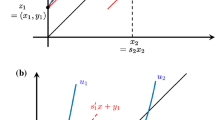Abstract.
We consider a simple production model and we assume that agents have unequal production skills which can in no way be attributed to their responsibility. We study how it is possible, if at all, to compensate for differential skills by applying Rawls's idea of a collective sharing in the benefits of skills. For this purpose, we introduce an axiom of solidarity, according to which agents should all be affected in the same direction if the profile of personal skills changes. We show that particular allocation rules are characterized be combining this axiom with a requirement of non-discrimination among preferences, or with a property capturing Nozick's idea of guaranteeing a minimal benefit from one's own skill.
Similar content being viewed by others
Author information
Authors and Affiliations
Additional information
Received: 1 July 1996/Accepted: 25 May 1998
Rights and permissions
About this article
Cite this article
Fleurbaey, M., Maniquet, F. Cooperative production with unequal skills: The solidarity approach to compensation. Soc Choice Welfare 16, 569–583 (1999). https://doi.org/10.1007/s003550050161
Issue Date:
DOI: https://doi.org/10.1007/s003550050161



